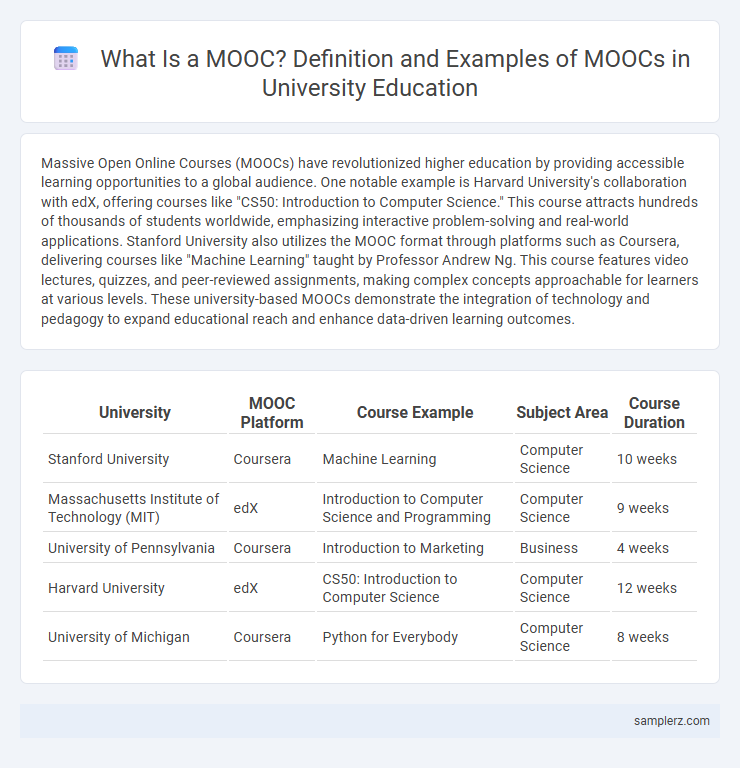Massive Open Online Courses (MOOCs) have revolutionized higher education by providing accessible learning opportunities to a global audience. One notable example is Harvard University's collaboration with edX, offering courses like "CS50: Introduction to Computer Science." This course attracts hundreds of thousands of students worldwide, emphasizing interactive problem-solving and real-world applications. Stanford University also utilizes the MOOC format through platforms such as Coursera, delivering courses like "Machine Learning" taught by Professor Andrew Ng. This course features video lectures, quizzes, and peer-reviewed assignments, making complex concepts approachable for learners at various levels. These university-based MOOCs demonstrate the integration of technology and pedagogy to expand educational reach and enhance data-driven learning outcomes.
Table of Comparison
| University | MOOC Platform | Course Example | Subject Area | Course Duration |
|---|---|---|---|---|
| Stanford University | Coursera | Machine Learning | Computer Science | 10 weeks |
| Massachusetts Institute of Technology (MIT) | edX | Introduction to Computer Science and Programming | Computer Science | 9 weeks |
| University of Pennsylvania | Coursera | Introduction to Marketing | Business | 4 weeks |
| Harvard University | edX | CS50: Introduction to Computer Science | Computer Science | 12 weeks |
| University of Michigan | Coursera | Python for Everybody | Computer Science | 8 weeks |
Top University-Backed MOOCs for Lifelong Learners
Harvard University offers the popular "CS50: Introduction to Computer Science" MOOC, widely recognized for its rigorous curriculum and accessibility to learners worldwide. Stanford University's "Machine Learning" course, led by Andrew Ng, remains a top choice for professionals seeking advanced knowledge in artificial intelligence. MIT OpenCourseWare provides comprehensive materials for courses like "Introduction to Biology," supporting continuous education for lifelong learners across diverse disciplines.
Innovative MOOC Models in Higher Education
Innovative MOOC models in higher education feature adaptive learning technologies that personalize course content based on real-time student performance data. Universities like Stanford and MIT implement project-based MOOCs integrating virtual labs and peer collaboration to enhance practical skills and engagement. These models leverage AI-driven analytics to optimize learning paths, increasing completion rates and academic success in large-scale online environments.
Leading Universities Offering Free Online Courses
Leading universities such as Harvard University, Stanford University, and the Massachusetts Institute of Technology (MIT) offer free Massive Open Online Courses (MOOCs) through platforms like edX and Coursera, providing learners worldwide access to high-quality education. These MOOCs cover diverse subjects ranging from computer science and engineering to humanities and business, enabling students to gain valuable knowledge without geographic or financial barriers. By leveraging interactive content, peer assessments, and certification options, these institutions set benchmarks for accessible and scalable online learning.
Successful MOOC Case Studies in Academia
Harvard University's CS50 Introduction to Computer Science consistently exemplifies successful MOOC implementation, attracting over 2 million learners globally and fostering widespread computer science education. Stanford University's Machine Learning course by Andrew Ng has transformed AI education, with enrollment surpassing 3 million students and spawning numerous specialized follow-ups. MIT's OpenCourseWare initiative offers extensive free access to course materials, catalyzing global academic collaboration and lifelong learning outside traditional enrollment.
Impactful University MOOCs Transforming Education
Harvard University's CS50 is a prominent MOOC that revolutionizes computer science education by providing accessible, high-quality content to millions worldwide. Stanford's AI course, offered through Coursera, has significantly democratized knowledge in artificial intelligence, fostering global skill development and innovation. These impactful university MOOCs exemplify how elite institutions scale education, break geographical barriers, and enable lifelong learning.
Collaborative MOOC Platforms in Universities
Collaborative MOOC platforms in universities, such as edX and Coursera, enable institutions like Harvard, MIT, and Stanford to jointly create and share high-quality courses globally. These platforms foster interactive learning environments where students from diverse backgrounds collaborate on projects, enhancing peer-to-peer knowledge exchange and skill development. By leveraging cloud-based tools and real-time feedback systems, universities optimize course delivery and engagement in massive open online courses.
Popular MOOC Subjects Provided by Universities
Popular MOOC subjects provided by universities include computer science, business management, and data science, reflecting high demand in the job market. Leading platforms like Coursera and edX collaborate with top institutions such as Stanford, MIT, and Harvard to offer these courses. These subjects often combine theoretical knowledge with practical applications, attracting thousands of global learners searching for flexible, accredited education.
Enhancing University Curriculum with MOOC Integration
Harvard University's use of edX MOOCs exemplifies enhancing university curriculum by integrating online courses into traditional degree programs, allowing students to access diverse subjects beyond campus offerings. This approach provides flexible learning pathways, enabling students to acquire interdisciplinary skills while maintaining academic rigor. Partnering with platforms like Coursera and FutureLearn further enriches curricula by incorporating globally recognized content and innovative teaching methods.
Global Access: University MOOCs Breaking Barriers
University MOOCs such as Harvard's EdX and Stanford's Coursera initiatives exemplify global access by offering hundreds of courses to millions of learners worldwide. These platforms break geographical and financial barriers, enabling students from diverse backgrounds to obtain high-quality education remotely. The widespread adoption of MOOCs by top universities significantly democratizes knowledge, promoting inclusive and continuous learning opportunities globally.
Future Trends in University MOOC Adoption
Harvard University's edX platform exemplifies future trends in university MOOC adoption by incorporating AI-driven personalized learning paths and real-time analytics to enhance student engagement. Integration of virtual reality modules and micro-credentialing reflects growing emphasis on immersive, skills-based education. Universities increasingly leverage partnerships with industry leaders to tailor MOOC content, aligning curricula with evolving workforce demands.

example of MOOC in university Infographic
 samplerz.com
samplerz.com